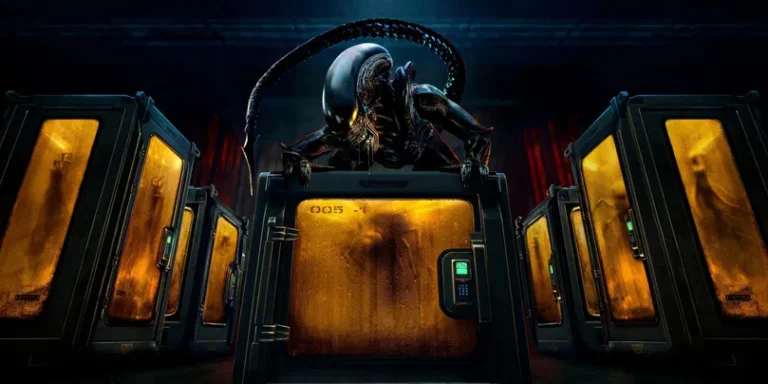
The Alien franchise has captivated audiences for decades, with its iconic xenomorphs, chilling atmosphere, and exploration of the human condition. Now, the saga continues with the highly anticipated series Alien: Earth, which takes viewers on a thrilling journey through a futuristic world where the struggle for power and the pursuit of immortality have taken center stage.
In this in-depth analysis, we’ll dive into the first three episodes of Alien: Earth, examining how the series pays homage to the original Alien films while introducing new and fascinating elements to the franchise. From the intricate web of corporate power struggles to the emergence of hybrid beings, we’ll unpack the key themes, characters, and plot points that have fans buzzing.
Connecting the Past and the Future
One of the most striking aspects of Alien: Earth is its seamless integration with the established Alien canon. The series is set in the year 2120, a mere 2 years before the events of the first Alien film, which took place in 2122. This temporal proximity allows the series to build upon the foundations laid by the original movies, while also expanding the scope and depth of the Alien universe.
As the Montauk, the ship featured in the series, makes its way back to Earth, it’s likely that the Nostromo, the iconic vessel from the first Alien film, is still in the midst of its own mission. This clever narrative device creates a sense of interconnectedness, allowing viewers to imagine the parallel stories unfolding across the vast expanse of space.
Moreover, the series introduces a new perspective on the world of Alien, showcasing the Earth-based power dynamics that have emerged in the intervening century. The dominance of five major corporations – Weyland-Yutani, Prodigy, Lynch, Threshold and Dynamic – paints a vivid picture of a future where the pursuit of profit and control has become the driving force behind humanity’s exploration of the cosmos.
The Rise of Hybrid Beings
One of the most intriguing elements of Alien: Earth is the introduction of hybrid beings – a fusion of human and artificial intelligence. These hybrids, such as the children from the Weyland facility, possess a unique blend of human consciousness and synthetic capabilities, blurring the lines between organic and inorganic life.
The series explores the ethical implications of these hybrids, as the Prodigy corporation seeks to exploit their abilities for its own gain. The way the adult actors portray the childlike mannerisms and innocence of the hybrid characters adds an unsettling layer to the narrative, raising questions about the nature of consciousness and the boundaries of humanity.
The character of Wendy, in particular, stands out as a compelling example of this hybrid dynamic. Her ability to empathically connect with the alien creatures and control the Prodigy’s systems suggests a deeper, more complex relationship between the hybrids and the extraterrestrial lifeforms.
As the series progresses, it will be fascinating to see how the hybrid characters evolve and how their unique abilities shape the ongoing conflict between the corporations vying for control of the alien specimens.
Corporatism and the Pursuit of Immortality
At the heart of Alien: Earth lies a commentary on the dangers of unchecked corporate power and the relentless pursuit of immortality. The five dominant corporations, each with their own spheres of influence, are driven by a singular goal: to unlock the secrets of eternal life, even if it means sacrificing human lives in the process.
The series presents a chilling vision of a future where the value of human life has been reduced to a mere commodity, with the corporations willing to exploit and manipulate their workers in the name of scientific progress. This theme is not new to the Alien franchise, as the Weyland-Yutani Corporation’s callous disregard for its employees has been a recurring motif throughout the films.
However, Alien: Earth takes this concept a step further, introducing a complex web of corporate rivalries and power struggles that add an additional layer of tension to the narrative. The series explores how these corporations, in their pursuit of immortality, are willing to resort to unethical and dangerous means, including the use of hybrid beings and the exploitation of alien lifeforms.
The Xenomorph Reborn

Of course, no discussion of the Alien franchise would be complete without the iconic xenomorph. Alien: Earth does not disappoint, delivering a visually stunning and terrifying reimagining of the classic creature.
The series’ depiction of the xenomorph is a testament to the franchise’s enduring legacy. The creature’s movements, design, and behavior remain true to the original films, while also introducing new and unsettling variations that keep viewers on the edge of their seats.
One of the most intriguing aspects of the xenomorph’s portrayal in Alien: Earth is the way it seems to exhibit a certain level of intelligence and agency. The creature’s occasional hesitation or playful behavior suggests a level of complexity that goes beyond the mindless killing machine seen in previous installments.
This added depth to the xenomorph’s character raises questions about the nature of its intelligence and its potential role in the ongoing conflict between the corporations. As the series progresses, it will be fascinating to see how the xenomorph’s interactions with the hybrid characters and the corporate entities shape the overall narrative.
Honoring the Alien Legacy
While Alien: Earth introduces new and innovative elements to the franchise, it also pays homage to the classic Alien films in a variety of ways. The series’ attention to detail, from the familiar aesthetic of the spacecraft to the chilling sound design, creates a seamless connection to the original movies.
Additionally, the series’ exploration of themes such as the dehumanizing effects of corporate greed, the blurring of the line between human and machine, and the existential horror of encountering the unknown, are all hallmarks of the Alien franchise. These thematic connections ensure that Alien: Earth feels like a natural extension of the Alien universe, rather than a mere spin-off or reboot.
For fans of the Alien franchise, Alien: Earth offers a tantalizing glimpse into the future of the series. By building upon the rich tapestry of the original films while introducing new and compelling elements, the series promises to captivate audiences and leave them eagerly anticipating the next chapter in the Alien saga.
Exploring the Alien Expanded Universe
As fans of the Alien franchise, there’s always more to discover and explore. Beyond the core film series, the Alien universe has expanded into a rich and diverse expanded universe, including novels, comics, and video games.
Conclusion
With its captivating narrative, stunning visuals, and thought-provoking themes, Alien: Earth has firmly cemented its place as a must-watch addition to the Alien franchise. By seamlessly blending the past and the future, the series offers a compelling exploration of the human condition in the face of the unknown, all while delivering the thrills and chills that fans have come to expect from the Alien universe.
As we eagerly await the release of future episodes, one thing is certain: the Alien saga continues to evolve and captivate, leaving us hungry for more of the cosmic terror that has defined this iconic franchise for generations.





